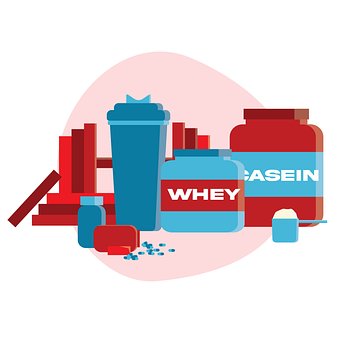
Collagen is a type of protein that is very abundant in the human body. It is found in bones, muscles, skin, and tendons.
Collagen is a protein that helps give strength and structure to the body. It is found in connective tissue and skin, and helps to keep the body’s cells together. Collagen also makes the skin elastic.
Collagen that is produced by the body is called endogenous collagen. Collagen that comes from an outside source, such as supplements, is called exogenous collagen.
Endogenous collagen is important for many reasons. Its depletion is linked to various health problems, such as scurvy.
People use collagen that comes from outside the body for cosmetic purposes, such as improving skin elasticity. Doctors also use it in techniques for wound healing.
What is collagen, and what does it do?
Collagen is a molecule that is a tough, insoluble, fibrous protein.
It plays a major role in many structures, such as:
- skin
- tendons
- blood vessels
- cartilage
- bone
- connective tissue, which anchors cells to each other
Collagen is a type of protein that forms the extracellular matrix, which is a group of molecules that provides support to the body’s tissues.
Healthy collagen levels contribute to:
- joint health
- protection of the kidneys and other organs
- skin elasticity
- a healthy cardiovascular system
Collagen is a protein that makes up a large part of the human body. Studies from the past have shown that this protein makes up one third of all the proteins in the human body, and three fourths of the dry weight in skin.
Collagen is a protein that is found in many different forms in the body. There are around 28 types of collagen, each with a different structure. Most forms of collagen are made up of fibrils, which are long and thin but also strong and flexible.
Collagen is a protein that provides strength and elasticity to the skin. As we age, our collagen levels falls and the collagen fibers become thinner and weaker. Some experts believe that this plays a role in skin aging. As a result, many skin care products include forms of collagen.
Medical and cosmetic uses
Some types of collagen can be broken down and absorbed back into the body. Others can be formed into structures outside the body and used for various medical purposes.
There are products available that claim to increase collagen levels, and these products can come from both humans and other species.
Skin fillers
Some fillers that contain both collagen and hyaluronic acid can help improve skin elasticity by stimulating collagen production.
This can help to increase the size of tissues and fill in any empty spaces such as wrinkles in the skin.
People use them to:
- reduce wrinkles
- improve the contours of the skin
- fill out depressions
- improve the appearance of scars
Manufacturers get these products from humans and other species. One type of filler uses cells from salmon and other fish. People should check where their product came from and test it for any allergies before using it.
Wound dressing
Collagen is a key protein in the natural process of wound healing.
Aspects that applications of collagen can help with include:
- controlling bleeding
- reducing inflammation
- managing blood vessel health and function
- boosting the strength of scar tissue
- restoring skin elasticity
- attracting cells that promote wound healing
- providing a platform for new tissue growth
Collagen wound dressings are created with the intention of promoting healing by containing collagen and other substances.
They can take the form of:
- dressings, for example, of sponge or fleece
- gels
- powders
Guided tissue regeneration
Collagen is sometimes used by doctors to create scaffolds. These scaffolds provide temporary support while the body is creating new cells during the healing process.
Membranes, plugs, or pads containing collagen can help with:
- bone regeneration
- wound healing
- managing extraction sockets after dental surgery
- promoting blood clotting
The research from 2011 noted that the collagen barriers can prevent the fast-growing cells around the gum from migrating to the wound. This would then preserve the space where the tooth cells have a chance to regenerate.
This means that the surgeon does not need to remove the membranes surgically once healing is complete.
Treatment of osteoarthritis
Collagen is essential for healthy cartilage and bones.
Some people say that taking supplements containing collagen hydrolysate may help to increase collagen levels and manage symptoms associated with osteoarthritis.
In 2018, scientists published the results of a trial involving 120 people. Half of the people took oral supplements containing collagen and other substances for 90 days, while the others took a placebo. In those who took collagen, joint pain decreased by 43%, and joint mobility improved by 39%.
More research is needed to determine if taking collagen supplements can improve joint health.
Skin revitalization
Making sure your collagen levels are high, either by boosts production or by preventing its decline, can help keep your skin looking young and elastic.
Possible ways of doing this include:
- surgical treatments, such as injecting fillers
- applying creams and other products
- oral supplements containing hydrolyzed bioactive collagen peptides, vitamins, and antioxidants
- dietary choices that provide nutrients and antioxidants that prevent oxidative stress
Certain nutrients may help boost collagen production or prevent its loss, according to some researchers.
Products that contain collagen and claim to increase levels in the body often times are topical cosmetics such as creams, powders, etc. Studies haven’t shown that the skin can absorb the necessary ingredients to make a significant difference.
Foods that contain collagen
While gelatin provides collagen, it is a protein substance that is derived from collagen after it has been cooked.
Animals have a connective tissue made of collagen. This means that foods such as chicken skin, pork skin, beef, and fish all contain collagen.
Vitamin C is needed for the production of collagen. You can get this vitamin from citrus fruits, broccoli, and bell peppers.
Further investigation is necessary to decide whether consuming foods rich in collagen contributes to raising collagen levels within your body, as they might not provide the same advantages as supplements.
The purpose of digestive enzymes is to break down the collagen in food into individual amino acids and peptides. However, supplements that contain collagen have already been broken down (hydrolyzed), which is why they are thought to be absorbed more efficiently than collagen from food.
In essence…
The most abundant protein in your body is collagen. You can increase your intake of collagen by taking supplements or eating animal foods and bone broth. However, your body may not absorb collagen as efficiently from food as it does from supplements.
Health benefits of collagen supplements
Collagen supplementation provides a variety of health benefits.
May improve skin health
Several studies have shown that collagen peptides or supplements containing collagen may help improve the appearance of your skin by reducing wrinkles and dryness.
The review of 11 studies found that taking 3-10 grams of collagen per day leads to improvements in skin elasticity and hydration. The studies focused mostly on women and the average length of time taking collagen was 69 days.
The purpose of these supplements is to stimulate your body’s own production of collagen, as well as promote the production of other proteins that help keep your skin looking healthy, like elastin and fibrillin.
Although there are many personal stories that claim that collagen supplements help get rid of acne and other skin conditions, there is no scientific evidence to support these claims.
May relieve joint pain
Collagen is a substance that helps keep cartilage healthy. Cartilage is a rubber-like tissue that cushions your joints.
As you age and your collagen levels decrease, you become more susceptible to degenerative joint disorders like osteoarthritis.
According to some studies, collagen supplements may help alleviate symptoms of osteoarthritis and reduce overall joint pain.
A review of five studies found that people who took collagen daily for an average of 24 weeks reported significant improvements in joint stiffness and pain.
Some researchers think that taking extra collagen might help the body make more collagen. This could reduce inflammation, improve joint support, and ease pain.
If you consume 10 grams of collagen each day, you will likely see some pain-relieving effects, based on most research conducted on the matter.
May prevent bone loss
Your bones would be very soft and weak without collagen.
As people age, the collagen in their bodies breaks down, causing their bones to become more porous. This can lead to osteoporosis, a condition marked by low bone density and an increased risk of fractures.
There have been studies that suggest that taking collagen supplements may help to prevent the bone loss that leads to osteoporosis.
In a 12-month study, women took either a calcium supplement with 5 grams of collagen or a calcium supplement and no collagen daily. The women who took the calcium supplement with collagen had significantly better bone health than the women who just took the calcium supplement.
By the end of the study, the group taking the calcium and collagen supplement had lower blood levels of bone-breakdown-promoting proteins than the group taking only calcium.
A separate study with 66 participants found that those who took 5 grams of collagen daily for 12 months had a bone mineral density increase of up to 7%. This is in comparison to those who did not take collagen.
Low Bone Mineral Density (BMD) is associated with weak bones and an increased risk for osteoporosis.
Promising results have been achieved, but further studies involving humans are necessary.
May boost muscle mass
Collagen is the most abundant protein in the body, making it an important component in skeletal muscle.
According to studies, collagen supplements can help people with sarcopenia (a condition where you lose muscle mass as you age) to gain more muscle mass.
A 12-week study found that men who took collagen while participating in a daily exercise program gained significantly more muscle mass and strength than men who exercised but didn’t take collagen.
Studies have shown that taking collagen supplements may help to build muscle by increasing the synthesis of muscle proteins, such as creatine, and also by stimulating muscle growth after exercise.
Even though collagen protein is not better than whey protein for creating muscle or strength, people still use it. This is because collagen is low in amino acids, which are a key element in muscle building.
We need to do more research to find out if collagen can help people gain muscle mass.
May promote heart health
People who take collagen supplements may be less likely to develop heart conditions, according to researchers.
If there is not enough collagen in the body, the arteries may become less flexible and less able to stretch.
If this occurs, it could result in atherosclerosis, which is a disease that causes your arteries to narrow. This could then lead to a heart attack or stroke.
In a 6-month study, 31 healthy adults took 16 grams of collagen daily and experienced a significant reduction in measures of artery stiffness from the study’s beginning to its end.
Their levels of good cholesterol also increased by 6%, which is a positive sign for heart health.
More research is needed to determine if collagen supplements have any benefits for heart health.
Other health benefits
Other potential health benefits of collagen supplements have not been thoroughly investigated.
- Hair and nails. Taking collagen may increase the strength of your nails by preventing brittleness. Additionally, it may help your hair and nails grow longer.
- Gut health. Although no scientific evidence supports this claim, some health practitioners assert that collagen supplements can treat leaky gut syndrome, also called intestinal permeability.
- Brain health. No studies have examined the role of collagen supplements in brain health, but some people claim that they improve mood and reduce anxiety symptoms.
- Weight loss. Proponents believe that collagen supplements may promote weight loss and faster metabolism. However, no studies support these claims.
Although there are promising potential effects, more research is needed before formal conclusions can be made.
Downsides and side effects of collagen supplements
Taking collagen supplements is generally safe, with few reported side effects.
People with allergies to fish, shellfish, and eggs should avoid collagen supplements made with these ingredients.
Some people have also reported feeling nauseous and bloated when taking collagen supplements, but these effects weren’t directly related to the supplements.
Other possible side effects of taking collagen supplements include indigestion and a sense of bloating.
Nevertheless, these supplements don’t seem to be unsafe for most people.
How long does it take to see results?
Although collagen turnover is a slow process, you will experience noticeable results after using it for at least 8 weeks.
The majority of studies looking at the effects of collagen on aspects of health like skin and joint pain relief last for a minimum of 8 weeks, though other studies looking at bone health benefits last for 12 months.
Therefore, it is important to be patient and not expect immediate results.
Alternatives to collagen
Since collagen’s amino acid composition is different from other proteins, the possible alternatives are limited.
Currently, no vegan collagen supplements are available.
You can buy supplements that contain the primary amino acids involved in collagen synthesis. Some of these supplements obtain these amino acids from vegan sources.
The tissues in your body may retain water better if they contain vitamin C and hyaluronic acid. These nutrients help keep tissues lubricated and moist.
Keratin, the protein that gives structure to hair, nails, and skin, has been suggested as an alternative to collagen. However, there is not much research to support keratin products for anything other than using them topically on skin and hair.
Keratin is not vegan as it comes from animals such as feathers, wool, and horns.
Summary
Collagen is a protein that is produced by the body. It is essential for the structure and function of skin, cartilage, bones, and connective tissue.
Collagen can be used to promote wound healing by creating a dressing.
The effects of using products with collagen or collagen boosters on skin have not been fully researched yet. Some people say these products improve their skin, but more evidence is needed to confirm this.














